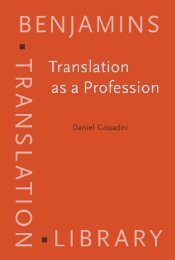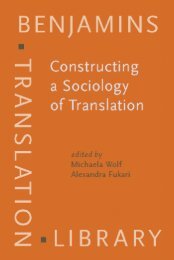Check your Vocabulary for IELTS.pdf
Check your Vocabulary for IELTS.pdf
Check your Vocabulary for IELTS.pdf
Create successful ePaper yourself
Turn your PDF publications into a flip-book with our unique Google optimized e-Paper software.
Answers<br />
5. To deposit money is to put money into a bank account To withdraw money is to take money out of a bank<br />
account (deposit can be a noun or a verb. The noun <strong>for</strong>m of withdraw is withdrawal).<br />
6. A wage and a salary are money you receive <strong>for</strong> doing a job, but a wage is usually paid daily or weekly and a<br />
salary is usually paid monthly.<br />
7. If you are broke, you have no money. It is an in<strong>for</strong>mal expression. If you are bankrupt, you are not able to pay<br />
back money you have borrowed. It is a very serious financial situation <strong>for</strong> somebody to be in.<br />
8. In the UK, shares are one of the many equal parts into which a company's capital is divided. People who buy them<br />
are called shareholders. Stocks are shares which are issued by the government. Dividends are parts of a<br />
company's profits shared out among the shareholders.<br />
9. Income tax is a tax on money earned as wages or salary. Excise duty is a tax on certain goods produced in a<br />
country, such as cigarettes or alcohol.<br />
10. To credit somebody's bank account is to put money into the account. To debit somebody's bank account is to take<br />
money out. In the UK, many people pay <strong>for</strong> bills etc. using a system called direct debit, where money is taken<br />
directly from their account by the company providing the goods or service.<br />
11. Traditionally a bank is a business organization which keeps money <strong>for</strong> customers and pays it out on demand or<br />
lends them money, and a building society is more usually associated with saving money or lending people money<br />
to buy houses.<br />
12. A discount is the percentage by which a full price is reduced to a buyer by the seller. A refund is money paid back<br />
when, <strong>for</strong> example, returning something to a shop (It can also be a verb: to refund)<br />
13. A bargain is something bought more cheaply than usual (the word can have other meanings - check <strong>your</strong><br />
dictionary). Something which is overpriced is too expensive. Something which is exorbitant costs much more than<br />
its true value.<br />
14. A worthless object is something which has no value. A priceless object is an extremely valuable object.<br />
15. If you save money, you put it to one side so that you can use it later. If you invest money, you put it into property,<br />
shares etc. so that it will increase in value.<br />
16. Inflation is a state of economy where prices and wages increase. Deflation is a reduction of economic activity.<br />
17. Income is the money you receive. Expenditure is the money you spend.<br />
18. If you lend money, you let someone use <strong>your</strong> money <strong>for</strong> a certain period of time. If you borrow money from<br />
someone, you take money <strong>for</strong> a time, usually paying interest.<br />
answers<br />
Task 2<br />
1. F 2. I 3. L 4. E 5. J 6. K (the Inland Revenue is a British government department dealing with tax) 7. C 8. H<br />
9. G 10. A 11. B 12. D<br />
Task 3<br />
1. borrow 2. loan 3. income 4. expenditure 5. overdraft 6, cost of living 7. Inflation 8. economise 9. building<br />
society 10. interest 11. on credit 12. exorbitant 13. save 14. reductions 15. bargain 16. discount 17. invest<br />
18. stocks 19. shares<br />
Other words and expressions which you might find useful include:<br />
Cash / cheque / credit card / statement / overdrawn / receipt / customs / inheritance tax / corporation tax / disability<br />
allowance / social security / currency / rate of exchange / investment /wealthy / debt / upwardly or downwardly mobile<br />
equity / negative equity<br />
Page 58 Politics answers<br />
Task 1<br />
1. democracy 2. independence (the adjective is independent) 3. candidate 4. totalitarian 5. authoritarian<br />
6. technocrats 7. opposition 8. republic 9. sanctions 10. House 11. ideology 12. Parliament<br />
The word in the shaded vertical strip is 'dictatorship'<br />
The British Parliament is divided into two houses. These are:<br />
1. The House of Commons. This is the lower house, which is made up of 659 elected members who are known<br />
as Members of Parliament, or MPs.<br />
2. The House of Lords. This is the upper chamber, which is made up of hereditary peers or specially appointed<br />
men and women.<br />
The House of Commons is the most important house. Many people in Britain want the House of Lords<br />
abolished because they see it as an outdated institution.<br />
Peter Collin Publishing, © 2001. For reference, see the English Dictionary <strong>for</strong> Students (1-901659-06-2)<br />
111

















